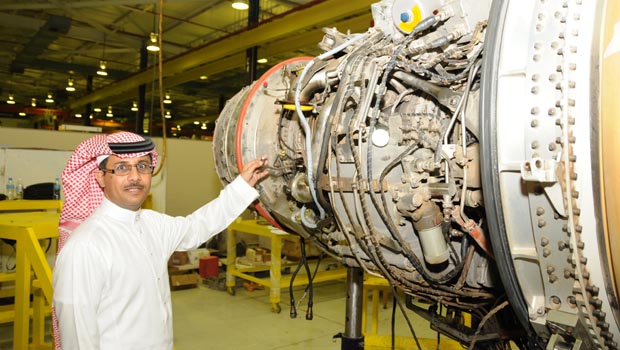Abdulahad S. Al-Turkistany, vice president for power plant maintenance, told Arab News that his department would be moving to a new state-of-the-art facility at King Abdulaziz International Airport in Jeddah in the near future.
Saudia’s existing maintenance center at the Old Jeddah Airport, north of Mahmoud Saeed Mall, is already a high-tech facility where repairs of all the airline’s different aircraft engines are done, saving about 30 percent in maintenance costs.
“So far, we have the capability to perform complete engine maintenance for the B747 classic fleet and the MD90 fleet. We are now developing the capability for the maintenance of Airbus 320 fleet engines and APUs (auxiliary power units),” Al-Turkistany said.
“We do only partial maintenance for the huge GE90 engines of Boeing 777s at the airport as we cannot take them inside our present facility. We’ll be able to provide maintenance to those engines at our new facility.”
Work on the new power plant maintenance center project would start early next year, he added.
“Spreading over 150,000 square meters, the new facility will provide us with the capability and capacity to offer power plant and APU maintenance services to other operators. It will also have advanced equipment to test engines after maintenance,” he explained.
He said the new center would offer a better working atmosphere, modern equipment and machinery. A lot of work will be automated with computerized systems. He said once designs are complete, tenders will be invited to carry out the project.
Al-Turkistany added all its maintenance services comply with safety regulations.
“We also provide continuous training to our engineers and technicians to keep them abreast of new developments and latest technologies,” he said, adding that the center is licensed by the Federal Aviation Authority (FAA) and European Aviation Safety Agency (EASA).
When asked about the growing number of plane accidents in recent months, Al-Turkistany said a number of factors come into play such as bad weather, human error, malfunction of an aircraft system or failure of some critical parts. However, he added that all aircraft models have many advisory and monitoring systems to alert pilots of any possible failures.
According to Hassan A. Habbash Alhazmi, director for power plant engineering and planning, the center maintains at least 10 engines monthly, including carrying out five overhaul services.
“We have started this month overhauling the CF34 General Electric engine that powers Embraer aircraft. We are now in a position to offer maintenance of this type of engine to other Embraer aircraft operators in the region who use the same type of engine. It took months of preparation for us to achieve this capability,” he said.
“We receive the engine and conduct a thorough inspection to detect its problems using a borescope (an optical device consisting of a flexible tube with an eyepiece on one end).”
Once the inspectors finish their job, they bring the report to the engineering department. Then a meeting of department heads is called to review the report and decide on the work required, the director said. Experts will also review the history of the engine and check all life-limited components and modules.
“We will also collect data from the plane to understand the on-wing performance of the engine,” Alhazmi explained.
Engineers and technicians strip the engine into modules at the engine shop. Each module will then be forwarded to its designated shop for repair or overhaul as required. Then all parts from the stripped module will be passed to the cleaning section to be cleaned in accordance with engine manual specifications. The parts are then sent to the inspection department for a final check.
Once all modules are built, it will be passed to the power plant shop to rebuild the complete engine, he added.










